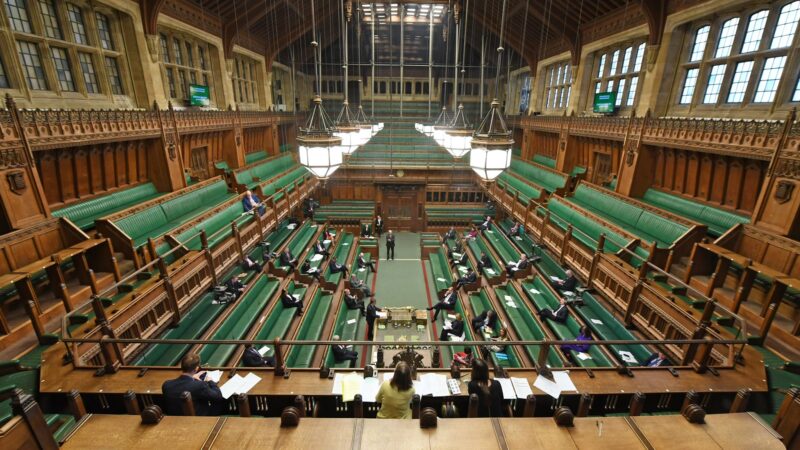
The government, with the support of Labour MPs, has rushed through the House of Commons legislation designed to tackle “dirty money” hidden in the UK after calls to clamp down on Russian oligarchs amid the ongoing conflict in Ukraine.
Addressing parliament this afternoon, Labour’s Yvette Cooper said the opposition party would “speed this bill through and wish it well”, adding: “We want to see stronger action against Russia at this time of international crisis”.
“We want to see stronger action against economic crime that puts us to shame and undermines our economy and the rule of law, and we need action on transparency, on regulation, on enforcement and on accountability – too many areas where there has not been progress for too long,” the Shadow Home Secretary said.
The bill will set up a ‘register of overseas entities’, listing the owners of land or property in the UK. Currently, many expensive properties in the country are owned by shell companies based abroad, which conceal the true owners.
The register will force companies to declare the identity of the “beneficial owner” of any land or property on an annual basis. Failure to register such details will be a criminal offence carrying a maximum custodial sentence of five years.
The government initially proposed that its new registration requirements would not come into force until 18 months after its passage but, after widespread criticism include from Conservative colleagues, changed this to six months.
Opposition and Tory MPs maintained concerns that such a delay will allow owners to transfer or dispose of assets before measures come into force, but the government rejected Labour’s plan for a 28-day grace period to declare assets.
Taking to social media after the debate this evening, Labour’s Jonathan Reynolds tweeted: “A lot of work from across the House has gone into the economic crime bill today. Labour pushed for action against Putin’s cronies in days not months so that oligarchs don’t get a head start to sell their ill-gotten gains and escape sanctions. This fight will now move to the Lords.”
Business minister Paul Scully told parliament that the government may bring in plans later this week to ensure that those who try to sell their properties within the six-month grace period have to declare their details at that point.
Labour’s Chris Bryant highlighted the links between the Tory Party and Putin’s regime. He said co-chairman Ben Elliott, who’s firm he said had made “restaurant recommendations in Crimea to Russian oligarchs”, should be investigated.
Labour’s Shadow Home Secretary Cooper told MPs there is “a huge responsibility” on the government to “make sure there is no conflict of interest” and ensure “proper distancing from the appalling activities of corrupt Russian elites”.
“We must vow that never again will we allow our major institutions to be so corrupted and influenced by corrupt elites, that we will give those involved in corruption and economic crime no place to hide – be it for Russia or anywhere else in the world, we will no longer stand for this,” she said.
Tory Aaron Bell called on ministers to consider revoking Lord Lebedev’s peerage. Reports emerged over the weekend that Boris Johnson personally intervened to dismiss security concerns over his appointment to the Lords. Priti Patel said this evening: “We have to rule nothing out.”
A majority of 74 MPs voted down the cross-party amendment new clause two, proposed by Labour MP Margaret Hodge, which would have required the minister to publish a report on the funding of enforcement agencies in connection with the reforms to ‘unexplained wealth orders’.
Unexplained wealth orders allow law enforcement to confiscate assets without having to prove that the property was obtained by criminal activity. The range of people who can be subject to an order and the grounds for granting one will be expanded under the new legislation passed this evening.
The government also rejected a cross-party amendment proposed by Tory MP David Davis that would have provided for the freezing of assets, such as land and property, when an oligarch’s name is announced – before they are actually sanctioned – by 300 votes to 234 this evening.
“The actions against the oligarchs in this bill are just as important as the actions against the Russian banks and commercial institutions. We should not kid ourselves, this is not an economic crime bill, it’s an economic warfare bill,” the senior Conservative backbencher told MPs.
The economic crime bill also makes provisions to extend ministerial powers to sanction individuals by, for example, removing the current requirement that people targeted must have known or suspected that they breached sanctions law.
Patel described the bill as a “clean sweep in terms of how we update, clean sweep in terms of accountability, but also in holding individuals and the enablers, the managers and all others responsible, to account”.
The legislation follows significant criticism of sanctions levelled by the UK as compared to those seen from its allies. The bill had been repeatedly delayed but is now being rushed through parliament. Having passed all the Commons legislative stages on Monday, the bill will now proceed to the Lords.




More from LabourList
Almost half of Labour members oppose plans to restrict jury trials, poll finds
‘How Labour can finally fix Britain’s 5G problem’
‘The University of the Air – celebrating 60 years of Harold Wilson and Jennie Lee’s vision’